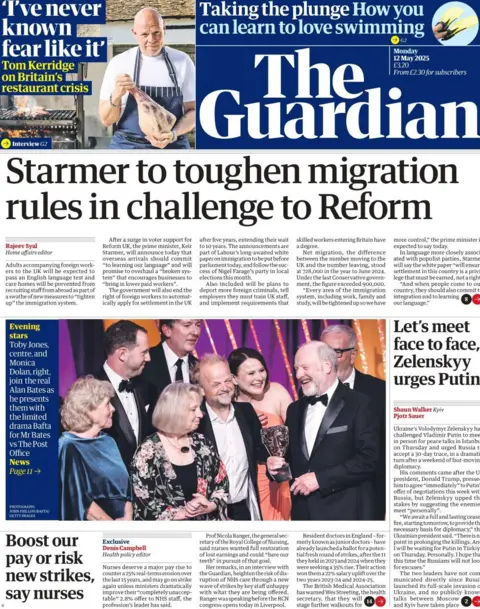The article discusses significant developments in UK politics regarding immigration policies as announced by Prime Minister Sir Keir Starmer, along with notable international diplomatic efforts by Ukrainian President Volodymyr Zelensky to negotiate with Russian President Vladimir Putin.
Starmer’s administration appears to be adopting a more hardline stance on immigration, with various news outlets reporting that the new policy is driven by internal political pressures, particularly from the rising popularity of the populist Reform UK party. According to the Guardian, the Prime Minister’s latest immigration rules are described as a “challenge” to the Reform UK’s influence after that party gained traction in recent local elections. For instance, the new regulation will require adult dependents accompanying foreign workers to pass English language tests, while also banning care homes from recruiting overseas staff, which could significantly impact the labor market in sectors that rely on foreign workers.
The Times expands on this narrative, outlining that migrants who consistently pay their taxes, engage in community volunteering, or hold high-skilled jobs will now be prioritized for residency rights. This strategy indicates a shift towards a more selective immigration framework, which aims to appeal to the conservative base and mitigate criticisms about failing to control immigration effectively. Conversely, the Daily Express has criticized these plans, suggesting they are insufficient and that Starmer is merely “pretending to be tough” on the issue.
Commentary in the Daily Mail echoes these sentiments by highlighting that Starmer’s proposals appear hastily crafted, purportedly to counteract the “surge” in popularity of Nigel Farage’s Reform UK party. The paper warns that the electorate will closely monitor the government’s actions, and any perceived deviations from this hardline stance could result in severe repercussions at the polls.
While the domestic scene is overshadowed by these immigration discussions, international matters equally demand attention. Zelensky’s willingness to engage in direct negotiations with Putin signifies a potential turning point in the ongoing conflict between Ukraine and Russia. Reports from the Metro newspaper emphasize that these discussions could be aimed at achieving peace, highlighting the pressures from the US government that may have facilitated this rapprochement. This sentiment is captured in the Times, which considers Zelensky’s willingness to negotiate a strategic move that might compel Putin to reconsider his position, especially if the Russian leader fails to respond positively.
The National Nursing Union’s general secretary, Nicola Ranger, has raised alarms about ongoing staffing issues in the National Health Service (NHS) amid calls for better pay for nurses. Ranger argues that without significant improvements in pay, there’s a looming possibility of further strikes, signaling the deepening discontent within the NHS workforce. Furthermore, commentaries from various newspapers underscore an overarching narrative of economic and social challenges facing the UK, as contrasted against key pop culture events like the Bafta TV awards, which also made headlines.
As relations unfold both domestically concerning migration and internationally regarding the potential for peace talks in Ukraine, the political landscape in the UK is marked by intense scrutiny and debate. The public and political analysts will likely keep a watchful eye on how these plans develop and their subsequent impact on both the domestic populace and Britain’s standing on the global stage.



